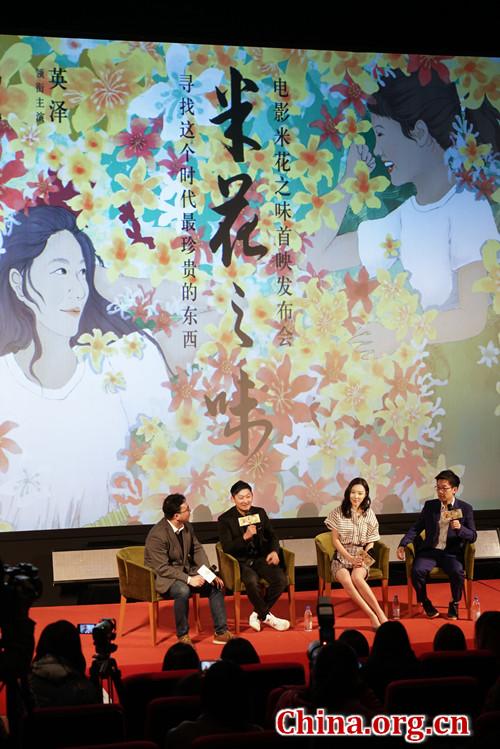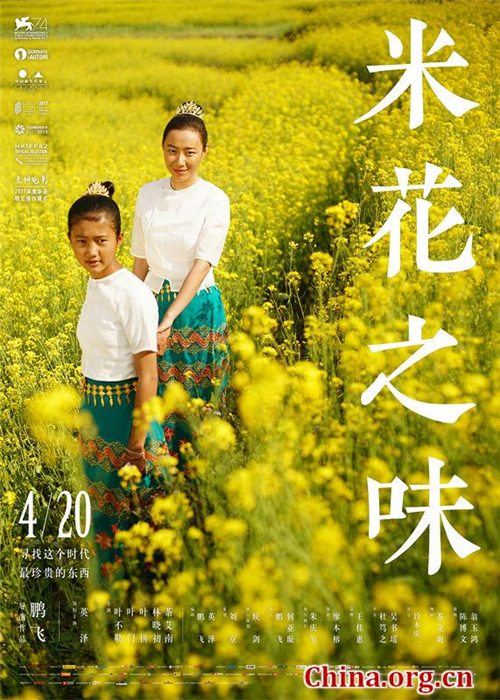Yunnan elements in “The Taste of Rice Flower”

Director Pengfei and his cast converse with the audience at the Chinese premiere of "The Taste of Rice Flower" in Beijing, on April 7, 2018. [Photo/ China.org.cn]
Indie film "The Taste of Rice Flower" held its Chinese premiere in Beijing on Saturday, highlighting the plight of the country's rural "left-behind" children with a narrative that is somehow relaxed, playful and humorous.
The latest from director Pengfei (full name Song Pengfei), the movie was screened as one of the events in the run-up to the 8th Beijing International Film Festival, scheduled for April 15 – 22. The film tells the story of an ethnic Dai mother (Ying Ze) who quits her job in a developed urban area and returns to her rural hometown near the Sino-Myanmar border in Yunnan province to take care of her troublesome young daughter.
At the premiere, Pengfei said it was fate that brought him to beautiful Cangyuan county in Yunnan province. "During the filming process, my life was full of joy and laughter. I want to present my real experience here to the audience," he said.
But the film is not about how to cook "rice flower, " a traditional snack of the Dai ethnic group. Pengfei hopes to use the food to symbolize the separation and reunion of family, and also hopes that the movie, like the taste of the snack, will leave audiences with a light but distinctive taste.
The surprisingly amusing film addresses the weighty issue of rural "left-behind" children, the millions of young people in China whose parents went to urban areas for work, as well as local religion, poverty and the survival of minority traditions in modern China.
"I felt that a serious style was not what I needed. So I made a film in a different style that other directors have not tried. The relaxed and playful style is also closely related to my experience in Yunnan. There are many conflicts among people there, but they soon smile and laugh, and forget about the conflicts the next day," he said.
Due to different cultural backgrounds, the film crew decided to live for months in Yunnan to experience life in the area and gain the local people's trust.

"For a long time, I was not accepted by the elderly people in the village," Pengfei recalled. "For example, I went to Taipei to participate in a film festival and brought back gifts for the children. They did not touch them. I asked why, they said, 'Grandma said you're a human trafficker.' And of course the crew were all my 'accomplices.'"
Pengfei thought of many ways to get to know the people. "I think the most effective thing is drinking. The local people are very good at drinking. Fortunately, I had 'sober-up' medicine along with me, and some village officials didn't get the best of me in drinking," he laughed.
To truly shape her character, actress Ying Ze revealed that she traveled to Yunnan four months in advance to learn the Dai dialect as well as a series of skills such as tea picking, pig raising and folk dancing.
When he was studying in France, Pengfei worked with Taiwanese director Tsai Ming-liang on the latter's "Stray Dogs." He made his own directorial debut in 2015 with "Underground Fragrance," which screened at the Chicago International Film Festival later that year.
The film's creative team had also previously worked with Tsai, as well as with renowned directors such as Edward Yang and Takeshi Kitano on other award-winning films.
Prior to the Chinese premiere, "The Taste of Rice Flower" had been screened at several film festivals abroad, including at the Venice Film Festival's Venice Days sidebar section, and won several accolades.
At the Pingyao International Film Festival last year, the director stated in an interview that he hoped the film would help more people understand the contradictions existing in the remote frontier areas of ethnic minority regions in the context of the country's economic development. He suggested that the use of his visual style in the film is one of the most powerful ways of seeing reality. The humorous script also contains an "anti-realistic" aesthetic, overturning norms for movies about rural China by including flashes of bright colors and optimism alongside the serious social issues.
"When I was participating in foreign film festivals and expos, international filmmakers often asked me if there were other genres of film in China besides commercial films and heavy-hearted art house films," Pengfei said at Saturday's premiere. "Their questions have had a great impact on me. I also constantly encourage and remind myself: starting from the heart and not following the trends, make different films in new ways for the audience. "
The film will hit Chinese theaters on April 20.
Editor: John Li